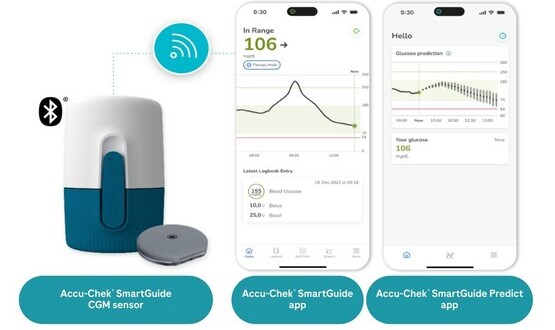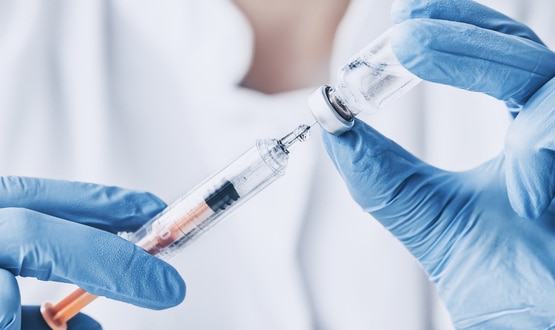Roche develops continuous glucose monitor with predictive algorithms

Roche has developed a continuous glucose monitor with predictive algorithms that gives patients with diabetes a way of managing their condition and reducing uncertainty, with a potentially powerful impact on their quality of life.
Roche unveiled the Accu-Chek SmartGuide CGM device, which is not yet available on the market, earlier this month at the 17th annual conference on Advanced Technologies and Treatments for Diabetes in Florence.
The device presents a retrospective and current view on glucose values and estimates trends, as well as indicating the risk of hypoglycaemia in the next 30 minutes and continually forecasting how glucose will develop in the next two hours. It also estimates the risk of nocturnal hypoglycaemia.
“This empowers users to be in control and take preventive decisions to adjust their therapy and pre-empt complications,” Professor Lutz Heinemann from Dusseldorf, Germany, told those attending the symposium in Florence and online.
The Swiss pharmaceutical giant also presented results of a study of 48 people with type 1 or type 2 diabetes with an overall mean absolute relative deviation (MARD) of 9.2% and 99.8% of the measured glucose values in zones A and B on the Parkes Error Grid. The Swiss pharmaceutical giant also presented topline results from a recent study evaluating the performance of the new solution.
The system’s accuracy and safety were assessed with 48 people with type 1 or type 2 diabetes participating in the study. The primary study objective – showing the accuracy of the solution – was met with high significance. This is shown by an overall MARD of 9.2 and 99.8% of all measured glucose values in zones A and B out of the four zones on the Parkes Error Grid.
Better predictability and peace of mind
Roche and other experts speaking at the symposium emphasised the positive psycho-social effects for patients of the predictability offered by the Accu-Chek device.
BBC World Service radio journalist Alex Ritson recalled his experience of suffering a hypoglycemic attack on-air in 2017, which he described as the “worst” experience of his career.
“I find this incredibly embarrassing to listen to,” he told the audience before a recording of the event was played, adding that the incident, while lasting just sixty seconds, represented “the longest minute of my life. I’ve done hundreds or thousands of programmes, but if anyone remembers any of them, it tends to be that one – or at least that’s the way I perceive it.”
The recording, he said, is often used by medical professionals around the world to demonstrate how quickly a hypo event can come on.
“Psychosocial impact is very interesting with chronic disease – the way it impacts the individual and the people who care for them,” said Professor Katharine Barnard-Kelly, a chartered health psychologist specialising in human factors assessment and the psychosocial impact of disease.
In an interview with Digital Health News, Professor Barnard-Kelly noted that depression is two to three times more prevalent amongst those with diabetes, while those with the disease also have a 45% prevalence of distress or burnout due to the stigma and burden of living with and self-managing the disease.
Because of the acute and potentially life-threatening nature of the disease, experiences like Ritson’s are terrifying, and can have long-lasting consequences, she said. Moreover, because diabetes is a progressive illness, patients have to continually work harder to maintain the same outcome. The Accu-Chek device’s promise to extend that period of consistency cannot be overestimated, she said.
“I think what is game-changing is that it buys you time,” Professor Barnard-Kelly added. “To have several hours of predictive notification – that buys you confidence, and time to be able to act to avoid hypos before they happen.”



